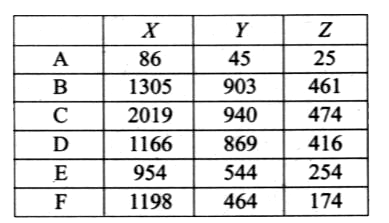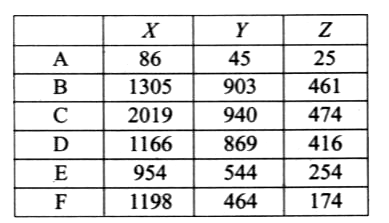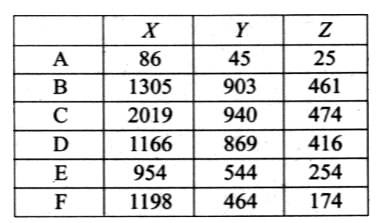The following data presents count of released convicts who have served prison terms (X), those who have received some educational or technical training during their terms ( Y) and those who were offered. Company placement (Z ) respectively, from six different jails A,B,C,D,E and f, in the year 2010.

Jails from which more than half of the trained convicts are offered jobs, are
A,B and C
A,B and D
A,D and E
A,E and F
Step by step video & image solution for The following data presents count of released convicts who have served prison terms (X), those who have received some educational or technical training during their terms ( Y) and those who were offered. Company placement (Z ) respectively, from six different jails A,B,C,D,E and f, in the year 2010. Jails from which more than half of the trained convicts are offered jobs, are by Maths experts to help you in doubts & scoring excellent marks in Class 14 exams.
Updated on:21/07/2023Similar Questions
The following data presents count of released convicts who have served prison terms (X), those who have received some educational or technical training during their terms ( Y) and those who were offered. Company placement (Z ) respectively, from six different jails A,B,C,D,E and f, in the year 2010.

Jail with highest placement rate of trained convicts is
View SolutionThe following data presents count of released convicts who have served prison terms (X), those who have received some educational or technical training during their terms ( Y) and those who were offered. Company placement (Z ) respectively, from six different jails A,B,C,D,E and f, in the year 2010.

Jails with highest and smallest percentage of trained convicts are respectively.
View Solution
Knowledge Check
There are seven persons A, B, C, D, E, F and G who were born on the same day of the same month of different year i.e. 1984, 1946, 1967, 1972, 1982, 1989 and 1992 but not necessarily in the same order. Note: Their age are considered as on the same month and day of 2017 as their date of births. The difference between the ages of B and C is twice the square root of the age of one of the any seven persons. Difference between the ages of C and D is the same as the number obtained by dividing ages of any of the other five persons. Age of A is greatest amongst those whose age is a multiple of five. E is older than G who is not the youngest. B is not youngest person.
Who amongst the following person is the oldest ?AABGCFDEThere are a great many people who have all the material conditions of happiness, i.e., health, sufficient income and clout, but who nevertheless, are profoundly unhappy. In such cases it would seem as if the fault must lie with a wrong theory as to how to live. We imagine ourselves more different from the animals than we are. Animals live on impulse and are happy as long as external conditions are favourable. Your needs are more complex than those of your pets but they still have their basis in instinct. In civilised societies, this is too apt to be forgotten. People propose to themselves some paramount objective and restrain all impulses that do not minister to it. A businessman may be so anxious to grow rich that to this end be sacrifices health and private affection, When at last he has become rich, no pleasure remains to him except harrying other people by exhortations to initiate his noble example.
Which one of the following is correct? The author is of the opinion thatAwe are superior to animalsBanimals are more impulsive than usCwe are really not very different from animalsDwe have the unique ability to control our impulses.There are a great many people who have all the material conditions of happiness, i.e., health, sufficient income and clout, but who nevertheless, are profoundly unhappy. In such cases it would seem as if the fault must lie with a wrong theory as to how to live. We imagine ourselves more different from the animals than we are. Animals live on impulse and are happy as long as external conditions are favourable. Your needs are more complex than those of your pets but they still have their basis in instinct. In civilised societies, this is too apt to be forgotten. People propose to themselves some paramount objective and restrain all impulses that do not minister to it. A businessman may be so anxious to grow rich that to this end be sacrifices health and private affection, When at last he has become rich, no pleasure remains to him except harrying other people by exhortations to initiate his noble example.
Which one of the following is correct?
The "material conditions of happiness" do not includeAhealthBmoneyCpowerDhope
In the following question, a given question is followed by information in three statements. You have to decide the data in which statement(s) is sufficient to answer the question and mark your answer accordingly.
A, B, C, D, E and F are six employees. Each of them gets different number of mails–15,20,30, 50, 60 and 70 everyday but not necessarily in the same order. Who is the shortest among all and what is the number of mails that D gets?
I. E is taller than only D and F. C is the tallest among all but does not get the least number of mails. A gets half the number of mails of what B gets.
II. A is taller than B. The sum of mails of A and E is equal to the number of mails that D gets. The one, who gets 50 mails is not the shortest. D does not get the highest number of mails.
III. A does not get 15 mails. B is not taller than A. D gets more mails than E but less than C.
View SolutionWhich type of palan is highlighted in each of the following statements ?
(a) Alcohol is not premitted within the factory premises.
(b) Company follows the practice of hiring employees who are above 25 years of age.
(c) Any employee found logging to any social networking site in the office will be subject to strict disciplinary action.
(d) 10% jobs reserved for women in every department.
(e) Strict penal actions against anyone who uses office stationery for personal use.
(f) A discount of 10% will be offered to all the customers buying goods worth 20000rs or more.
(g) Library will issue the books for 7days.
(h) Girls will be given a rebate of 5% in cut off for admission in the college.
View SolutionThere are a great many people who have all the material conditions of happiness, i.e., health, sufficient income and clout, but who nevertheless, are profoundly unhappy. In such cases it would seem as if the fault must lie with a wrong theory as to how to live. We imagine ourselves more different from the animals than we are. Animals live on impulse and are happy as long as external conditions are favourable. Your needs are more complex than those of your pets but they still have their basis in instinct. In civilised societies, this is too apt to be forgotten. People propose to themselves some paramount objective and restrain all impulses that do not minister to it. A businessman may be so anxious to grow rich that to this end be sacrifices health and private affection, When at last he has become rich, no pleasure remains to him except harrying other people by exhortations to initiate his noble example.
Which one of the following is correct? Modern man is very unhappy because the
View SolutionRead the following passage and answer the questions.
To think of the geniuses and the glfted as having uniquely different brains is only reasonable if we accept that each human brain is uniquely different. The purpose of instruction is to make us even more different from one another. In the process of being educated we can learn from the achievements of those more gifted than ourselves. But before we try to emulate geniuses, or encourage our children to do So, we should note that some of the things we learn from them may prove unpalatable. We may envy their achievements and fame, but we should also recognise the price they may have pald in terms of perseverance, singlemindedness, dedication, restrictions on their personal lives, the demands upon their energy and time, and how often they had to display great courage to preserve their integrity or to make their way to the top.
Genlus and giftedness are relative and descriptive terms of no real substance. We may, at best, give them some precision by defining them and placing them in a context but, whatever we do, we should never delude ourselves into believing that gifted children or geniuses are different from the rest of humanity, except in the degree to which they have developed their abilities.
In which sense do the geniuses and the gifted have uniquely different brains?
View SolutionRead the following passage and answer the questions.
To think of the geniuses and the glfted as having uniquely different brains is only reasonable if we accept that each human brain is uniquely different. The purpose of instruction is to make us even more different from one another. In the process of being educated we can learn from the achievements of those more gifted than ourselves. But before we try to emulate geniuses, or encourage our children to do So, we should note that some of the things we learn from them may prove unpalatable. We may envy their achievements and fame, but we should also recognise the price they may have pald in terms of perseverance, singlemindedness, dedication, restrictions on their personal lives, the demands upon their energy and time, and how often they had to display great courage to preserve their integrity or to make their way to the top.
Genlus and giftedness are relative and descriptive terms of no real substance. We may, at best, give them some precision by defining them and placing them in a context but, whatever we do, we should never delude ourselves into believing that gifted children or geniuses are different from the rest of humanity, except in the degree to which they have developed their abilities.
Explain the sentence, "Genius and giftedness are relative and descriptive terms of no real substance."
View Solution
